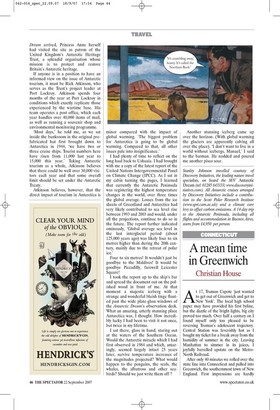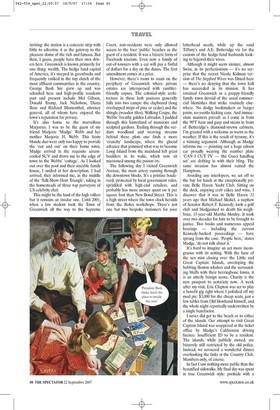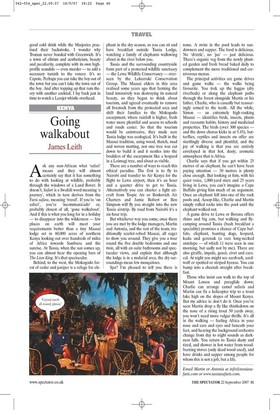A mean time in Greenwich
Christian House At 17, Truman Capote 'just wanted to get out of Greenwich and get to New York'. The local high school paper may have provided his first byline, but the dazzle of the bright lights, big city proved too much. Over half a century on I found myself only too pleased to be reversing Truman's adolescent trajectory. Central Station was feverishly hot as I bought my ticket for a break away from the humidity of summer in the city. Leaving Manhattan to simmer in its juices, I joyfully barrelled upstate on the MetroNorth Railroad.
After only 40 minutes we rolled over the state line into Connecticut and pulled into Greenwich, the southernmost town of New England. First impressions are hardly inviting: the station is a concrete strip with little to advertise it as the gateway to the pleasure dome of the rich and famous. But then, I guess, people have their own drivers here. Greenwich is known primarily for one thing: wealth. The hedge fund capital of America, it's steeped in greenbacks and frequently ranked in the top clutch of the most affluent communities in the country. George Bush Snr grew up and was schooled here and high-profile residents past and present include Mel Gibson, Donald Trump, Jack Nicholson, Diana Ross and Richard Blumenthal, attorney general, all of whom have enjoyed the town's reputation for privacy.
It's also home to the marvellous Marjories. I was to be the guest of my friend Marjorie 'Madge' Webb and her mother Marjorie H. Webb. This feisty blonde duo were only too happy to provide the 'out and out' on their home town. Madge arrived in the requisite airconcooled SUV and drove me to the edge of town to the Webbs"cottage'. As I looked out over the pool and their sizeable family house, I smiled at her description. I had arrived, they informed me, in the middle of the 'Talk-Show-Host Triangle', taking in the homesteads of three top purveyors of US celebrity chat.
This might be the land of the high rollers but it remains an insular one. Until 2001, when a law student took the Town of Greenwich all the way to the Supreme Court, non-residents were only allowed access to the four 'public' beaches as the guest of a resident. It was a bizarre form of Facebook tourism. Even now a family of out-of-towners with a car will pay a fistful of dollars for a day on the dunes. The first amendment comes at a price.
However, there's room to roam on the periphery of Greenwich where private estates are interspersed with ramblerfriendly copses. The colonial-style architecture in these lush pastures generally falls into two camps: the clapboard (long overlapped strips of pine or cedar) and the shingle (wooden tiles). Walking Coupe, the Webbs' breathy golden Labrador, I padded through this hinterland of mansions and sculpted gardens. Trailing through the verdant woodland and weaving streams behind these plots one finds a more 'crunchy' landscape, where the glacial advance that jemmied what was to become Long Island from the mainland left great boulders in its wake, which now sit marooned among the poison ivy.
The following day I visited Greenwich Avenue, the main artery running through the downtown blocks. It's a pristine boulevard, protected by local government rules, sprinkled with high-end retailers, and probably has more money spent on it per square foot than New Bond Street. This is a high street where the town clock heralds from the Rolex workshops. There's not one but two bespoke stationers for your letterhead needs, while up the road Tiffany's and A.E. Betteridge vie for the custom of the hedge-fund husbands looking to bejewel their wives.
Although it might seem sinister, almost Swiss, in its perfectionism — it's no surprise that the recent Nicole Kidman version of The Stepford Wives was filmed here — there's no denying that the town hall has succeeded in its mission. It has retained Greenwich as a preppy-friendly family town devoid of the usual commercial blemishes that strike routinely elsewhere. No dodgy bookmakers or burger joints, no youths kicking cans. And immaculate manners prevail: as I come in from the 90°F heat and gasp and steam in front of Betteridge's diamond-strewn cabinets, I'm greeted with a welcome as warm as the weather. If this is the result of tyranny, it's a winning argument. Although as Madge informs me — pointing out a huge saloon car proudly wearing the number plate 'CAN I CUT IN' — `the Gucci handbag set' are drifting in with their bling. The same invasion has almost ruined the Hamptons.
Avoiding any interlopers, we set off to the bay for lunch at the exceptionally private Belle Haven Yacht Club. Sitting on the deck, enjoying crab cakes and wine, I discover that it was in Belle Haven 32 years ago that Michael Skakel, a nephew of Senator Robert E Kennedy, took a golf club and bludgeoned to death his neighbour, 15-year-old Martha Moxley. It took over two decades for him to be brought to justice. Two books and numerous appeal hearings — including the current Kennedy-backed proceedings — have sprung from the case. 'People here,' states Madge, 'do not talk about it.'
It's hard to imagine an act more incongruous with its setting. With the haze of the sea mist closing over the Little and Great Captain Islands, enveloping the bobbing Boston whalers and the surrounding bluffs with their herringbone lawns, it is an utterly benign scene. Charity is the new passport to notoriety now. A week after my visit, Eric Clapton was set to play a benefit gig right where I polished off my mud pie: $3,000 for the cheap seats, just a few tables from Old Slowhand himself, and the whole night reportedly underwritten by a single benefactor.
I never did get to the beach or to either of the islands. Our attempt to visit Great Captain Island was scuppered at the ticket office by Madge's Californian driving licence: insufficient ID to be a resident. The islands, while publicly owned, are bizarrely still restricted by the old policy. Instead, we savoured a wonderful dinner overlooking the links at the Country Club. Members only, of course.
In fact I saw nothing more public than the beautified sidewalks. My final day was spent in true Greenwich style: poolside with a good cold drink while the Marjories practised their backstroke. I wonder why Truman never bonded with Greenwich. It's a town of elitism and aestheticism, beauty and peculiarity, complete with its own highprofile scandals — even murder — to add a necessary tarnish to the veneer. It's so Capote. Perhaps you can take the boy out of the town but you can't take the town out of the boy. And after topping up that rum theory with another cocktail, I lay back just in time to watch a Learjet whistle overhead.



































































 Previous page
Previous page